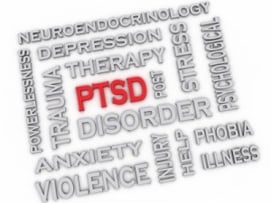
PTSD, or Post Traumatic Stress Disorder, affects the lives of about 5.2 million people in the United States each year, meaning about 3.6% of adults. PTSD is a psychiatric disorder caused by witnessing a life-threatening or terrifying traumatic event or events. Knowing someone who was diagnosed with PTSD can be very overwhelming and can take a toll on an existing relationship. Those experiencing PTSD symptoms may become moody and distant, which can be difficult to understand for those trying to be supportive. It is important to understand that many of the person’s actions stem from a nervous system that is constantly in a state of fear, worrying about constant threats to their safety.
Sometimes it is hard to understand what the best ways are to help someone with PTSD. There are many resources online to learn about PTSD. Read our article PTSD: Relieving Symptoms with Neurofeedback to learn more about what your loved one is going through. Remember to have ways to manage your own stress and issues, because your loved one may be struggling too much to be able to help at this moment. It’s understandable that this may cause mixed feelings for you because you may feel hurt that one side of your relationship is doing more than the other side. Don’t give up hope. Recovery is possible.
The best way to show support is to spend as much time with those who are suffering as possible without overwhelming them. Despite the mood changes happening with your loved one, remember to try to do normal things together, things you would have done together before the diagnosis. Be sure that none of these things may trigger memories of traumatic events. When your loved one is ready to talk about their traumatic experiences, allow them the safe space to do so and be ready to listen without interrupting. This requires great patience, as it may take your loved one some time to have the ability to open up about the issues with which they are trying to cope. When listening, remember to always come from a place of understanding and acceptance. Those suffering from PTSD need to rebuild trust in many areas of their life and they need to feel safe expressing thoughts to their loved ones. If the person feels judged in any way, they will not feel comfortable opening up to anyone and it will delay progress.
 Additional ways to help your loved one with PTSD is to help make their lives as stress-free as possible. Help them maintain a normal day-to-day schedule by creating routines. This helps make a person feel as though they are functioning normally and safely. Always keep any promises you make, because in rebuilding trust in the world is impossible if the people you trust most do not follow through with what they say they will do. Encourage them to seek professional help, including therapy, support groups, and neurofeedback.
Additional ways to help your loved one with PTSD is to help make their lives as stress-free as possible. Help them maintain a normal day-to-day schedule by creating routines. This helps make a person feel as though they are functioning normally and safely. Always keep any promises you make, because in rebuilding trust in the world is impossible if the people you trust most do not follow through with what they say they will do. Encourage them to seek professional help, including therapy, support groups, and neurofeedback. If your loved one experiences a flashback and/or panic attack, remember to stay calm and try to ground them. Remind them that the experience they are having is indeed a panic attack, and despite how it feels, they are safe. Encourage them to ground themselves by naming things they see around them to remind them where they are. Remind them to take slow and deep breaths because hyperventilation will only increase feelings of fear and panic.
Remember that you should not be assisting your loved one on your own. Make sure other members of the person’s family and friends are doing their part to be supportive so all of the responsibility does not fall solely on you. If you need help coping with your own feelings, it is highly recommended to see a professional for help. Schedule a free consultation with our director Dr. Jolene Ross to develop a plan for your unique needs.
First photo courtesy of David Castillo Dominici at www.FreeDigitalPhotos.net
Second photo courtesy of David Castillo Dominici at www.FreeDigitalPhotos.net





